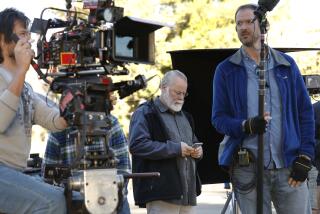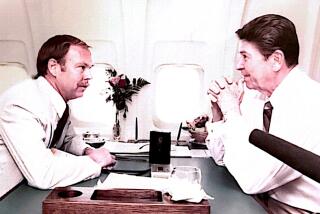Governor, mayor lack roles in writers strike
Gov. Arnold Schwarzenegger and Los Angeles Mayor Antonio Villaraigosa seem perfectly positioned to help resolve the Hollywood writers strike.
But so far the former movie star and the onetime labor negotiator are at best bit players in the 4-day-old walkout that threatens the region’s economy and, possibly, the political fortunes of the two elected leaders.
Schwarzenegger had spoken with writers and producers over the weekend and was monitoring the strike, an aide said. But he and other state leaders, including Assembly Speaker Fabian Nuñez (D-Los Angeles), mostly were watching the strike from the sidelines even as writers urged Schwarzenegger to take a more active role.
The governor has worked on both sides of the camera as a member of the Screen Actors Guild and as a producer of some of his own films.
“The governor is ideally situated because of his position and his background to convince the companies to negotiate seriously,” said Howard A. Rodman, a board member of the Writers Guild of America, West, who is walking picket lines this week. “The fact that he is not using his official and unofficial powers to do that is very disappointing.”
But other labor leaders doubted whether Schwarzenegger would be an effective mediator, given his relationships with Hollywood’s kingmakers.
“I don’t know what impact he has, knowing that the studios gave him money” when he was working as a producer, said Art Pulaski, executive secretary-treasurer of the California Labor Federation. “I don’t know if this is a case where somebody like Schwarzenegger would make a difference.”
Villaraigosa has tried to exert his influence -- with few tangible results. He met at City Hall last week with Writers Guild President Patric M. Verrone and other guild officials to hear their case. And he said he spoke with several studio chiefs, including News Corp. President Peter Chernin, Warner Bros. Chairman Barry Meyer and CBS Chief Executive Leslie Moonves.
Villaraigosa said in an interview that he had encouraged both sides to continue talking and had offered to mediate, but officials from the producers’ side have turned him down, according to an official with the Alliance of Motion Picture and Television Producers, who said it was too soon to engage the mayor.
Others have questioned whether Villaraigosa could mediate objectively in light of his labor background. The mayor had a long history of union work -- including as an organizer for United Teachers Los Angeles -- before entering politics.
Villaraigosa insists that he would be objective and points to his record of successfully mediating labor disputes and contract negotiations involving bus drivers, hotel workers and city unions. Those experiences and his new role as chief executive of the city, he said, have taught him a lesson.
“You have got to be invited by the parties,” he said. “You can try to impose yourself and sometimes be effective at that. But when the parties are . . . a billion dollars apart, you’re not going to be able to bridge that.”
Hollywood has a history of keeping labor strife under its own roof.
Writers and producers brokered a deal during the last strike in 1988 without the involvement of Tom Bradley or George Deukmejian, then mayor and governor, respectively, according to officials on both sides.
In this latest case, the issues are more complex and uncertain, the parties say, as they fight over the amount that writers should receive when their work appears on home video and is distributed over the Internet.
So far, neither side is willing to bend.
“It’s hard for an outsider to come in and influence that state of mind,” said John Furia Jr., who served as Writers Guild president in the mid-1970s. “I think ultimately economic pressures and enlightened self-interest will bring the two sides together.”
The strike comes at a difficult time for California and Los Angeles. Both the state and the city face bleak financial forecasts, the result of declining revenue, the housing credit crisis and other forces.
Schwarzenegger this week ordered all departments to submit plans that would cut their spending for the coming fiscal year by 10% in response to a state budget deficit that could reach $10 billion.
Similarly, Villaraigosa last week ordered all city department managers to produce budget proposals for the 2007-08 fiscal year with no increases. He also called for a second set of plans reflecting an 8% cut to counter the potential loss of $270 million in telephone user taxes.
A long strike would only deepen the financial problems. Villaraigosa has predicted that a slowdown similar to the 1988 strike would cost the area more than $1 billion.
“This could have a deleterious impact on the L.A. economy and on the revenues we desperately need to provide services to people in the city,” he said in an interview this week.
Aware of the strike’s financial fallout, the Los Angeles City Council approved a resolution by President Eric Garcetti on Wednesday making City Hall available as a neutral location for both sides to resume talks.
Labor experts do not expect the gesture to get much traction.
“I’m not sure the powers of location are as important as the powers of persuasion,” said Peter Dreier, director of the Urban and Environmental Policy Institute at Occidental College.
“It could take a serious impasse before the two sides realize that someone like the mayor or the governor could be useful.”
duke.helfand@latimes.commarc.lifsher@latimes.com
RELATED STORIES Rally: Writer-producers of top shows back strikers. A1Column: How much worse can network TV get? A20
More to Read
From the Oscars to the Emmys.
Get the Envelope newsletter for exclusive awards season coverage, behind-the-scenes stories from the Envelope podcast and columnist Glenn Whipp’s must-read analysis.
You may occasionally receive promotional content from the Los Angeles Times.







